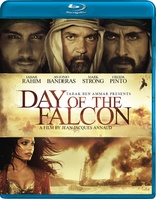Day of the Falcon Blu-ray Movie
HomeDay of the Falcon Blu-ray Movie 
Black GoldImage Entertainment | 2011 | 130 min | Rated R | Mar 26, 2013
Movie rating
6.6 | / 10 |
Blu-ray rating
| Users | 0.0 | |
| Reviewer | 3.0 | |
| Overall | 3.0 |
Overview
Day of the Falcon (2011)
Set in the 1930s Arab states at the dawn of the oil boom, the story centers on a young Arab prince torn between allegiance to his conservative father and modern, liberal father-in-law.
Starring: Tahar Rahim, Mark Strong, Antonio Banderas, Freida Pinto, Nathin Art ButlerDirector: Jean-Jacques Annaud
| Drama | Uncertain |
| Adventure | Uncertain |
Specifications
Video
Video codec: MPEG-4 AVC
Video resolution: 1080p
Aspect ratio: 2.34:1
Original aspect ratio: 2.39:1
Audio
English: DTS-HD Master Audio 5.1 (48kHz, 24-bit)
Subtitles
English SDH, Spanish
Discs
50GB Blu-ray Disc
Single disc (1 BD)
Packaging
Slipcover in original pressing
Playback
Region A (locked)
Review
Rating summary
| Movie | 2.5 | |
| Video | 5.0 | |
| Audio | 4.0 | |
| Extras | 2.5 | |
| Overall | 3.0 |
Day of the Falcon Blu-ray Movie Review
There Will Be Blood in the Sand
Reviewed by Michael Reuben March 25, 2013Day of the Falcon, which was originally titled Black Gold for international markets, is a curious and not entirely successful amalgam of the West and the Mideast. The standard marketing line is that the film is one of the most expensive productions every produced and financed by Arab interests and filmed in Arab locales—which is accurate but not complete. The producer and primary creative force behind the project, Tarak Ben Ammar, is a native Tunisian, but he is also a fillmmaking veteran with decades of experience that include overseeing the Tunisian shoots for Raiders of the Lost Ark and Monty Python's Life of Brian, producing TV mini-series on the lives of Jesus and the disciples and producing films for Brian DePalma (Femme Fatale) and Guiseppe Tornatore (Baarìa). Ben Ammar has had his share of flops (notably, 2002's Ballistic: Ecks vs. Sever), but anyone with his longevity in film and TV has to have sharp commercial instincts. As much as Ben Ammar may have aspired to create a film from the Arab point of view, he clearly wanted to appeal to a broad international audience. Day of the Falcon's source material was a novel by a Swiss author, Hans Ruesch. The director was a Frenchman, Jean-Jacques Annaud. A Dutchman, Menno Meyjes, wrote the screenplay from an adaptation by Annaud and fellow Frenchman Alain Godard. When it came to casting, many of the extras and supporting players were local actors in Ben Ammar's Tunisian homeland, where much of principal photography occurred. But the key roles of the two opposing Arabian tribal leaders were played by a Spaniard and an Englishman, the two Arab princes by Muslims born and raised in France and England, and the main female roles by natives of Bombay and Ethiopia. Now, I'm not suggesting a "political correctness" test in which Day of the Falcon fails because its staffing and casting were ethnically and nationally "inauthentic". My point is simply that the film's producer assembled the project in the same way as any other major motion picture, drawing from industry veterans and with an eye on the international box office. And that is indicative of why something feels badly "off" about this ambitious enterprise, even though all the money ended up on the screen. For all the film's "made in the Muslim world" credentials, it still feels like a Western take on Arabia, pouring the region's history into the same mold for cinematic epics created by the likes of David Lean and Otto Preminger—and the mold doesn't fit the material. Ironically, one of the very subjects of Day of the Falcon is how Westerners arrived in the Arabian desert and failed to understand the world view of its inhabitants. How, then, should one interpret a plot that elevates as a hero the prince who ultimately embraces that very Western view? Notwithstanding its references to the Quran and its depictions of tribal life, Day of the Falcon plays as an account of how the discovery of oil dragged the Muslim world, kicking and screaming, from savagery into civilization. Even within the film's own terms, that hardly sounds like an Arab point of view.
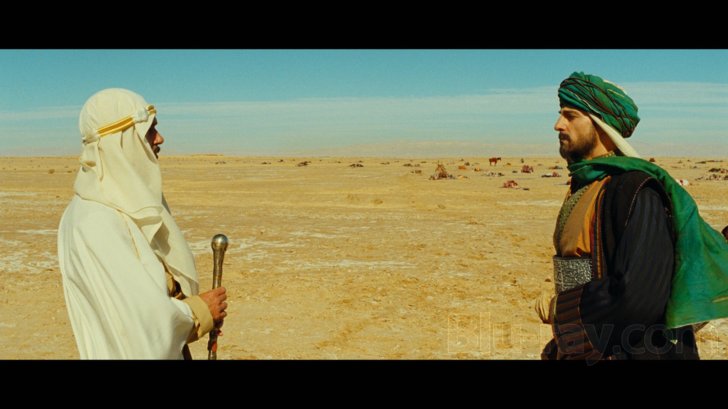
Though the specific date isn't provided, Day of the Falcon opens in the early 1920s, when, as we are told in opening text, the peninsula now known as Saudi Arabia is split among feuding tribes. Two great leaders meet to settle a war in which one has lost and another has prevailed. They are Sultan Amar (Mark Strong) and Emir Nesib (a miscast Antonio Banderas), and they agree that the patch of desert over which they have been fighting, known as the Yellow Belt, shall be a no man's land claimed by neither. To secure the peace, Emir Nesib, the victor, insists that Sultan Amar hand over his two young sons as hostages. Years later, Sultan Amar's sons have grown into men under Emir Nesib's care. The elder brother, Saleeh (Akin Gazi), is a traditional Arab prince interested in combat and falconry, while the younger, Auda (Tahar Rahim, star of The Prophet), is bespectacled, bookish and clumsy. This being a traditional Hollywood movie with character arcs painted in capital letters for the audience to see in advance, it is already obvious that Prince Auda will be the one to magically transform into a great leader by the end of the film. Both princes are closely watched from her sequestered quarters by Emir Nesib's daughter, Princess Leyla (Freida Pinto), with whom they played as children until she was whisked away at an age when girls are deemed too old to continue associating with boys. Does anyone doubt on which brother Princess Leyla's affections have settled? The delicate balance between the two tribes—and, indeed, of the entire region—is upset by the arrival of Thurkettle (Corey Johnson), an oilman from Texas, whose surveys indicate rich deposits under the Yellow Belt. In violation of his agreement with Sultan Amar, Emir Nesib permits Thurkettle to dig wells in the region that was supposed to remain untouched. Soon the Emir's coffers are overflowing with oil wealth, and he is able to build schools, hospitals and libraries, as well as acquire armored vehicles and advanced weaponry. Emir Nesib buys the temporary loyalty of local tribesmen with baubles like Swiss watches, but neither his abrogation of the agreement with Sultan Amar nor the presence of foreign infidels goes unnoticed. As the region becomes increasingly dangerous and unsettled, Emir Nesib schemes how to use Amar's sons against him, while, on the other side of the Yellow Belt, Amar plots his revenge. Since we know the historical outcome, the defeat of those seeking to prevent the development of the region's oil is inevitable. If Day of the Falcon had fully represented those interests and truly shown the world through their eyes, it might have succeeded better as drama. But one can sense the dice being loaded, as those who oppose exploitation of the desert are routinely treated as Luddites and fundamentalists. Only Sultan Amar is given speeches that approach the level of quality (and Mark Strong lends the character the requisite gravitas) to suggest the legitimacy of the concerns by indigenous people when powerful foreign interests offer a deal that seems too good to be true. All the locals have to do is agree to a long-term and possibly permanent presence by outsiders that will irreparably transform the country and the culture. Is that really so much to ask? And who will control this new wealth, and how will it be used? Change may be inevitable, but it should not be undertaken lightly, especially by leaders who feel any sense of responsibility for their people, as Sultan Amar clearly does and Emil Nesib just as clearly does not. Day of the Falcon ultimately trivializes complex social and political issues by suggesting that the solution was simply to replace a "bad" king (Emir Nesib) with a "good" one (Prince Auda). Anyone with even a passing familiarity with the history of the region knows that matters aren't so simple. Still, if one can overlook the script's superficiality, Day of the Falcon does offer gorgeous desert scenery, several remarkable battle scenes and worthy performances from Strong, Rahim, Pinto and, in a small but pivotal role late in the film, Liya Kebede as a freed slave who joins the army led by Prince Auda and is perhaps intended as the film's nod to an independent Arab woman of the future. The first third of the film is its most tedious portion, because it is dominated by Banderas, who fails to inhabit his role. Not for an instant do you believe that his Emir Nesib is anyone other than a Spanish actor in Arab garb, and a comic actor at that. Banderas recites lines as if he were expecting a laugh to follow, and he makes you wonder how this Emir could ever have bested Mark Strong's Sultan Amar in battle. Now there is a warrior.
Day of the Falcon Blu-ray Movie, Video Quality 
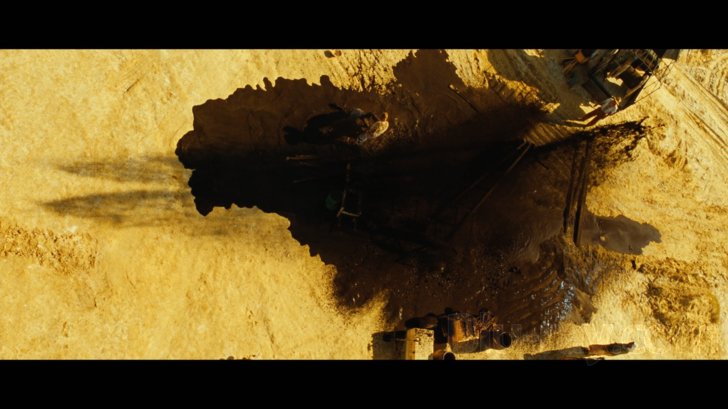
Whatever its limitations as a film, Day of the Falcon certainly shines on Blu-ray. Sumptuously photographed by French cinematographer Jean-Marie Dreujou using primarily film, with an occasional shot acquired in HD and the sources harmonized in post-production on a digital intermediate, the film has the epic sweep that is typical of director Annaud's work. Image Entertainment's 1080p, AVC-encoded Blu-ray provides both the scale of the landscapes (with Tunisia and Qatar standing in for Saudi Arabia) and the fine detail of weather-beaten skin, clothing, camel and horse hair and, of course, endless varieties of sand. Colors range from the bright yellows of the daytime desert to the deep blues and blacks of the night, with a varied palette of hues for the finery of the royal family and its retinue in Emir Nesib's household and also for Sultan Amar's attendants. The grain pattern from the filmed portions has been retained in its natural form, but it is so fine that it will hardly be noticed. None of the image's sharpness appears to have been induced by artificial means, and the image is free of artifacts caused by compression or other digital anomalies. (The extreme weather conditions under which the production photographed did generate an occasional lens flare, however.) Overall, this is about as good a Blu-ray image as one could hope to see for complex desert scenes of combat involving tanks, camels, horses and guns. I just wish it were in service of a better film.
Day of the Falcon Blu-ray Movie, Audio Quality 
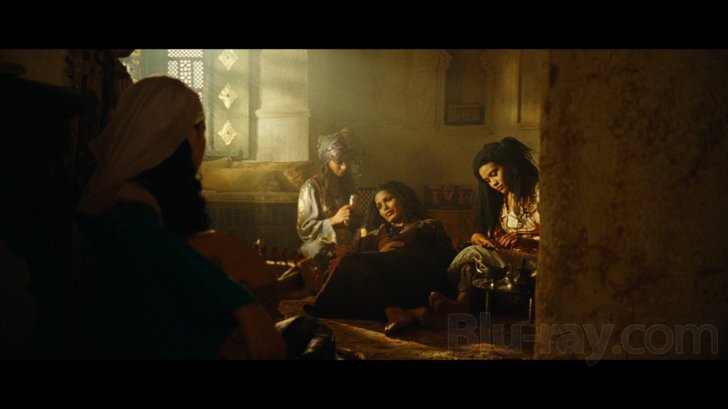
Perhaps because its producer and director were aiming for a traditional Hollywood-style epic, the soundtrack to Day of the Falcon, encoded as DTS-HD MA 5.1, avoids the kind of "whiz-bang" effects that one associates with action films, even though there are many scenes that would support them. Even a big effect involving a huge oil tank explosion is relatively sedate, at least compared to how Michael Bay would have done it. The soundtrack is well-mixed with clear dialogue, effects that blend smoothly and a distinct sense of each environment, but the surrounds do not call attention to themselves. James Horner's contemplative, almost mournful score, which features vocals by Fahad Al Kubaisi, attempts to bridge the gap between the film's Western point of view and its Middle Eastern subject matter, with mixed success.
Day of the Falcon Blu-ray Movie, Special Features and Extras 
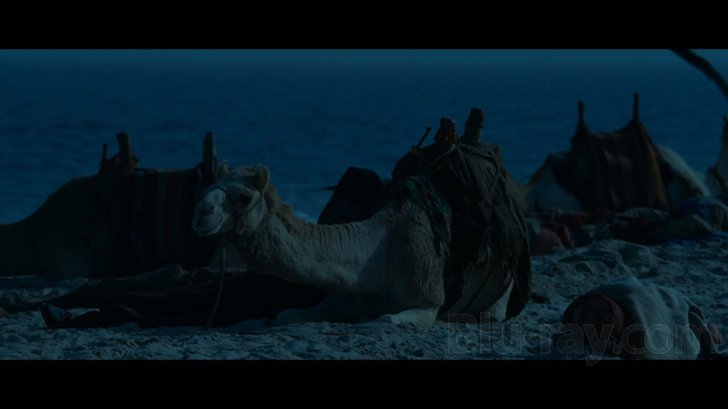
Image Entertainment's Blu-ray contains some, but not all, of the supplements featured on the Region B-locked French edition of Black Gold. Omitted are the following: one of the two documentaries; the two photo galleries; and the commentary, in French, by director Jean-Jacques Annaud. (As is evident in the documentaries, Annaud speaks fluent English, but he either wasn't available or wasn't willing to record a new commentary.)
- The Making of Day of the Falcon (1080p; 1.78:1; 42:01): A comprehensive documentary produced by Ben Ammar's company, Quinta Communications, and his co-producer in Qatar, the Doha Film Institute, this overview of the film's production traces its history from inception through the completion of principal photography, with a brief look at post-production. Interviews are included with Ben Ammar and Annaud, as well as the principal cast and composer James Horner. Of perhaps greatest interest is the footage from the various locations, which conveys the mammoth scale of the undertaking.
- Transforming the Desert: The Visual Effects of Day of the Falcon (720p; 2.35:1; 3:13): Special effects shots at various stages before and after compositing.
- From Storyboard to Screen (1080p; 1.78:1; 2:56): An excerpt from a key battle sequence involving an airplane. The finished film is inset next to the original storyboards.
- Trailers: The film's trailer is not included. At startup, the disc plays trailers for The Tall Man and The Numbers Station, which can be skipped with the chapter forward button and are not otherwise available once the disc loads.
Day of the Falcon Blu-ray Movie, Overall Score and Recommendation 
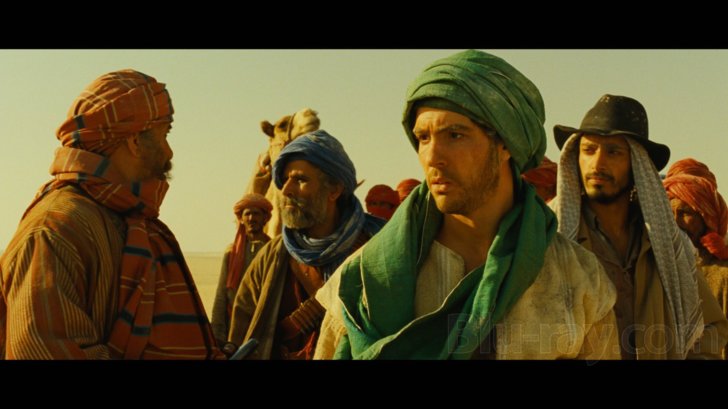
In "The Making of Day of the Falcon", the founder of Qatar's Doha Film Institute says that their "investment" in the film lies in the opportunity for aspiring young filmmakers to observe firsthand a professional film company at work. Her comments reflect an astute, long-term view. The film that Day of the Falcon aspires to be will almost certainly not be made by Westerners. It will be made by as-yet-unknown talents who emerge from places like the DFI and, having absorbed the techniques of classic Hollywood epics, reinvent them for their own purposes, to tell their own stories. Day of the Falcon stands as an object lesson in the futility of outsiders trying to tell the story of a culture they are still trying to understand. Lawrence of Arabia works, because its hero is one of the outsiders. Day of the Falcon is Arabia without Lawrence, and it never gets beyond the surface. Recommended as a Blu-ray, but not as a film.
Similar titles
Similar titles you might also like

The Crusades
1935

Land of the Pharaohs
Warner Archive Collection
1955

The Ten Commandments 4K
1956

Tom Clancy's Jack Ryan: The Complete Series
2018-2023

The Bible: In the Beginning...
1966

Anonymous
2011

Last Days in the Desert
2015

Salome
1953

The Last King
Birkebeinerne
2016

The Egyptian
Limited Edition to 3000 - SOLD OUT
1954

Becket
1964

Kings of the Sun
1963

Harum Scarum
Warner Archive Collection
1965

Taras Bulba
1962

Knightfall: Season One
2017

The King's Speech
2010

Tower of London
1939

Anastasia
Limited Edition to 3000
1956

Exodus: Gods and Kings
2014

The White Princess
2017
